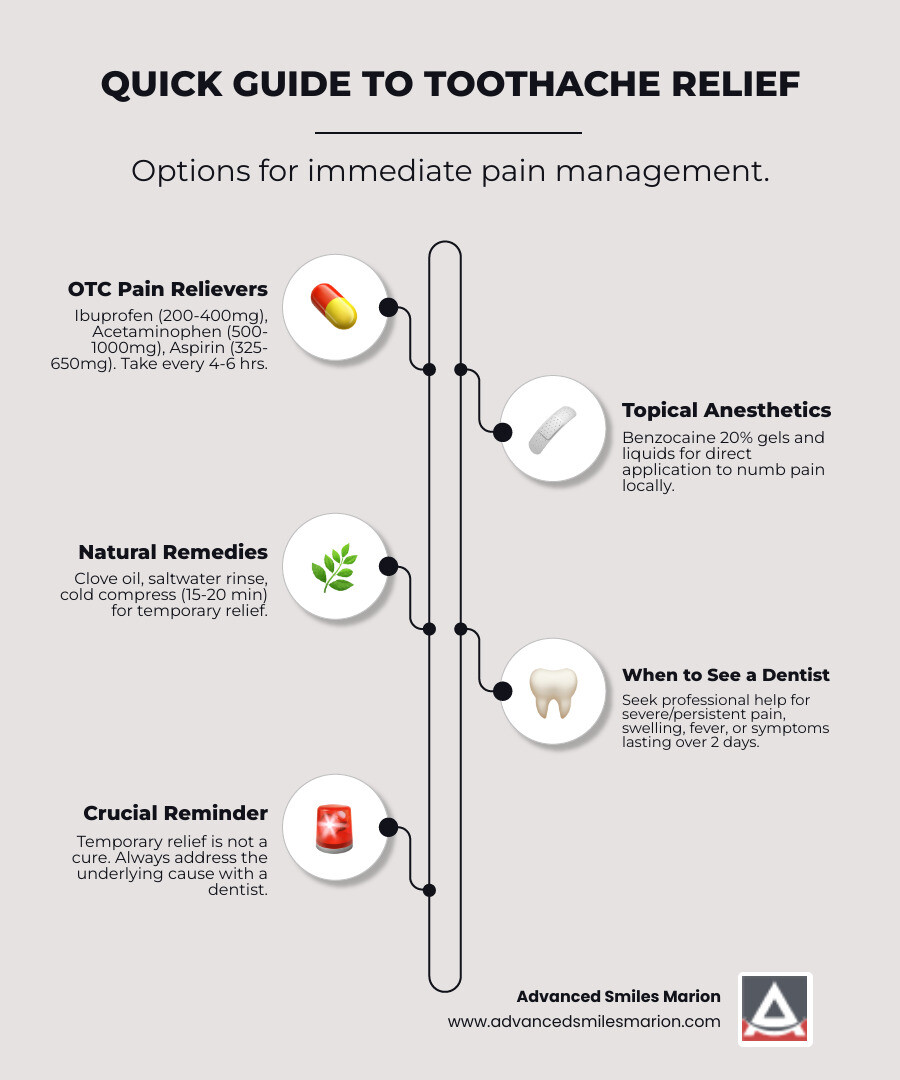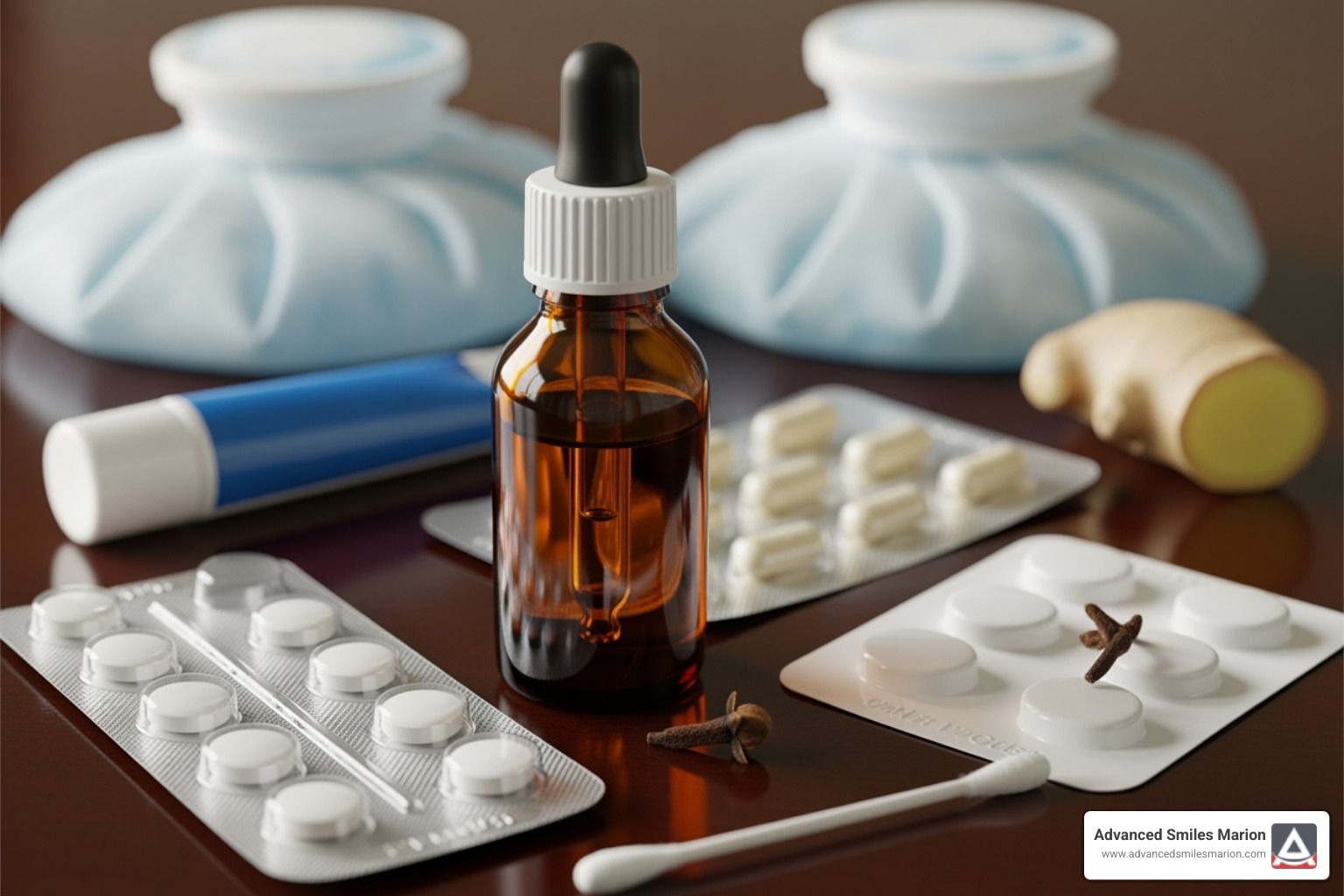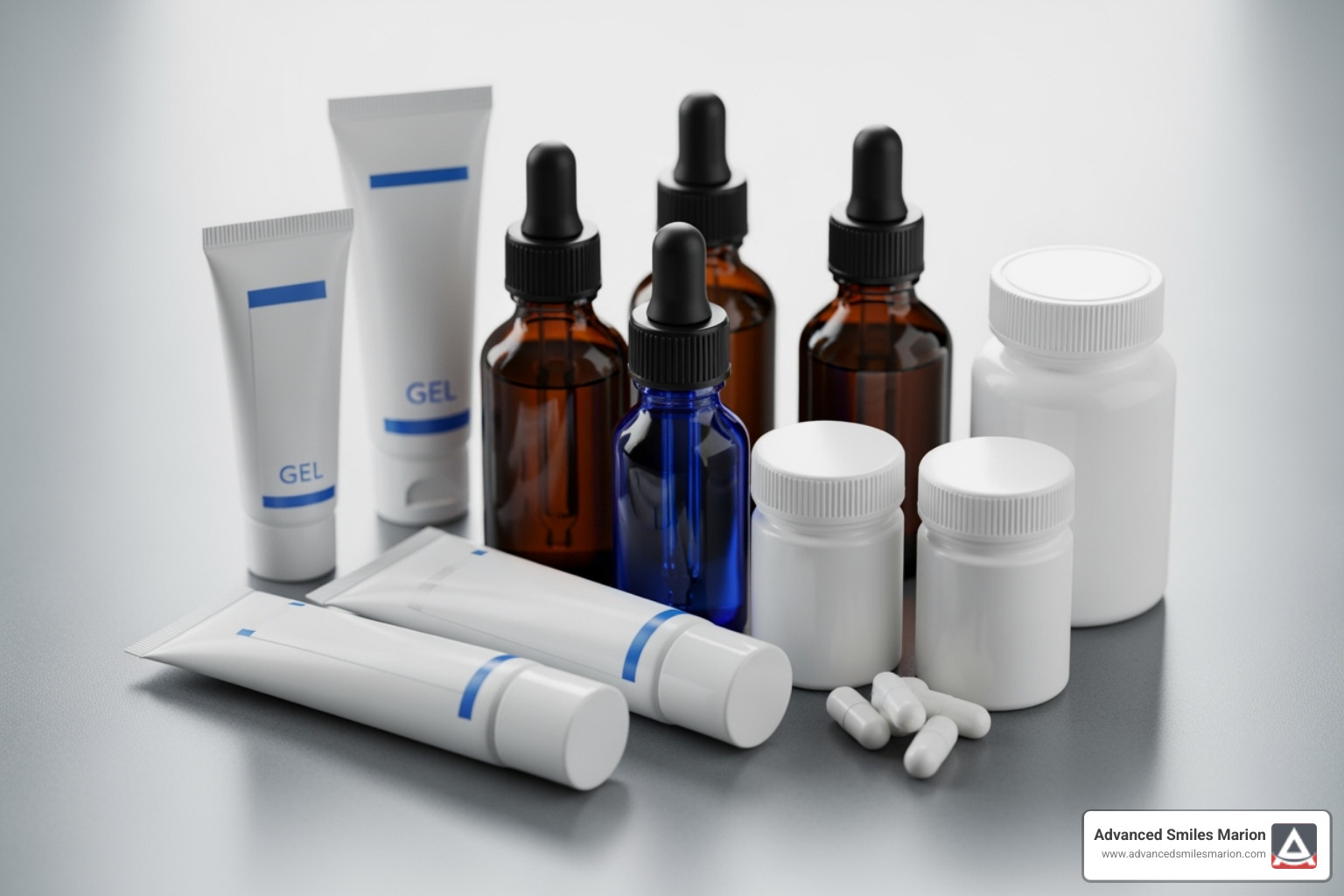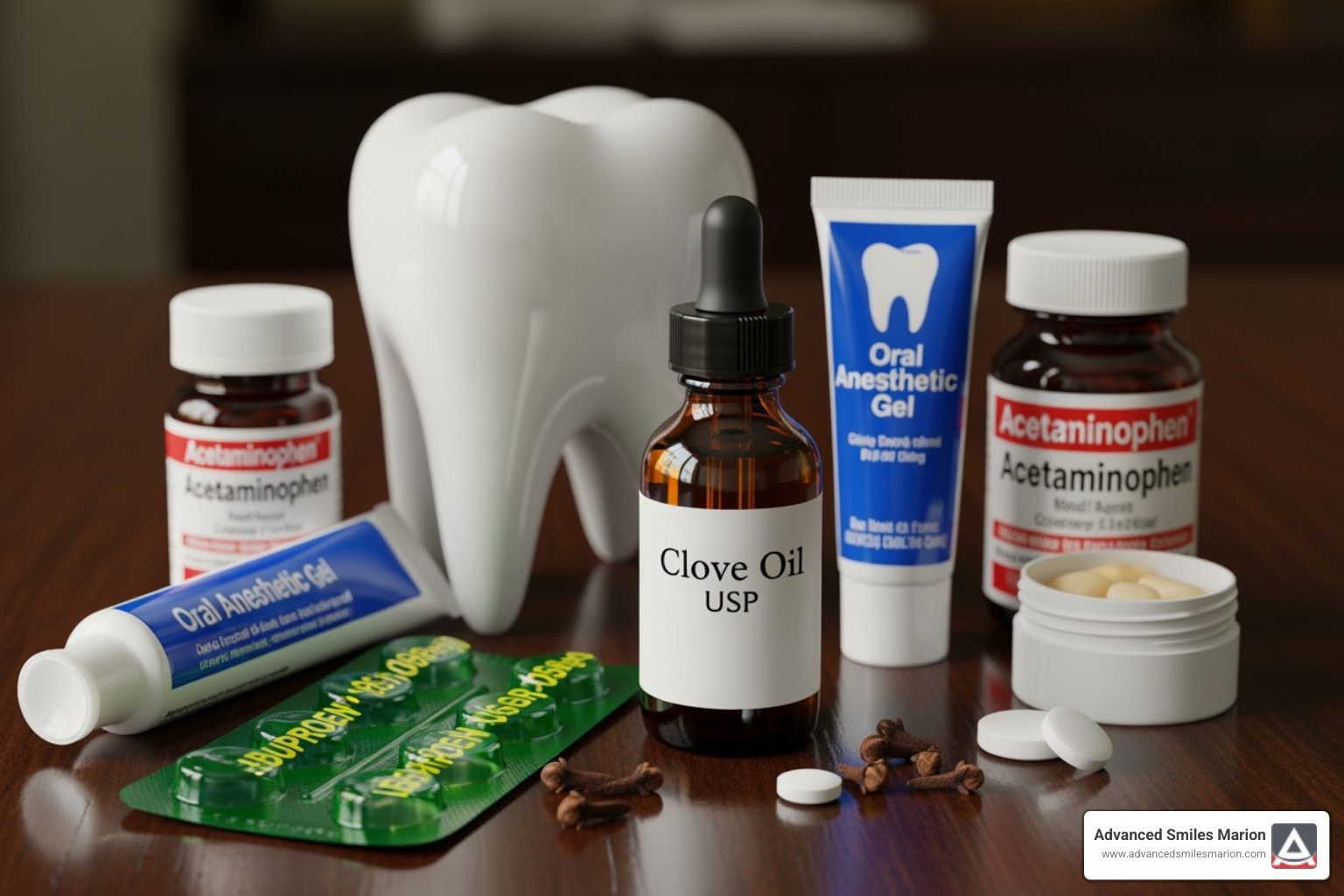Why Understanding Your Toothache Medicine Options Matters
Toothache medicine provides crucial relief when dental pain strikes, but knowing your options is key to effective pain management.
Quick Reference for Toothache Medicine:
- Over-the-Counter Pain Relievers: Ibuprofen (200-400mg every 4-6 hours), Acetaminophen (500-1000mg every 4-6 hours), Aspirin (325-650mg every 4 hours)
- Topical Anesthetics: Benzocaine 20% gels and liquids for direct application
- Natural Remedies: Clove oil, saltwater rinse, cold compress (15-20 minutes)
- When to See a Dentist: Severe pain, swelling, fever, or symptoms lasting more than 2 days
While toothache medicine offers immediate comfort, temporary relief is not a cure. The underlying cause requires professional diagnosis and treatment. Understanding your options—from over-the-counter solutions to natural remedies—helps you make informed decisions while you arrange for proper dental care.
At Advanced Smiles Marion, our highly educated dentists use specialized training and advanced technology to provide comprehensive toothache guidance and treatment. Our team stays current with the latest pain management techniques and can often see patients the same day for emergency dental situations.

Easy toothache medicine glossary:
Understanding Your Toothache: Common Causes and Symptoms
When a tooth throbs, it's a signal that something is wrong. Toothache medicine is a temporary fix while you determine the underlying cause.
- Tooth decay is the most common culprit. Bacteria produce acids that erode tooth enamel, and a cavity can become painful as it reaches the tooth's sensitive inner layers.
- Gum disease causes inflammation and infection from plaque buildup, leading to swelling, bleeding, and a deep, aching pain. If it progresses, it can affect the bone supporting your teeth.
- A chipped or broken tooth from an injury or grinding can expose the sensitive inner pulp, causing sharp pain with temperature changes or pressure.

- An abscessed tooth is a serious infection inside the tooth's pulp. The resulting pus buildup creates intense, throbbing pain that can spread to the jaw and cause a fever, requiring immediate attention.
- Exposed roots from receding gums leave the sensitive root surface vulnerable to hot, cold, sweet, or acidic foods.
Your pain may worsen at night for a few reasons. When you lie down, increased blood pooling in your head puts more pressure on inflamed tissues. With fewer distractions, your brain also focuses more on the discomfort, and any toothache medicine taken earlier may be wearing off.
The educated dentists at Advanced Smiles Marion use advanced diagnostic tools to quickly identify the cause of your discomfort. Understanding these symptoms helps you communicate effectively with our dental team. For more information, The American Dental Association on dental symptoms is a valuable resource. Treating the underlying cause is the only way to achieve lasting comfort.
Over-the-Counter Toothache Medicine for Immediate Relief
When tooth pain strikes, several effective toothache medicine options are available at your local pharmacy to help you manage discomfort until you can get professional dental care.

Over-the-counter (OTC) products include oral pain relievers (pills) and topical anesthetics (gels/liquids). These treat symptoms, not the underlying problem. They provide immediate relief, but you still need proper treatment to heal. At Advanced Smiles Marion, we often see patients the same day for dental emergencies. For more information, see our guide on emergency treatment for toothache.
How Oral Pain Relievers Work
The three most common oral pain relievers for tooth pain are ibuprofen, acetaminophen, and aspirin. Understanding their differences can help you choose the right one.
- Ibuprofen is often recommended because it relieves pain and reduces inflammation, a common source of tooth pain. Take 200-400 mg every 4-6 hours with food.
- Acetaminophen is a good alternative if ibuprofen upsets your stomach. It blocks pain signals in the brain but does not reduce inflammation. Take 500-1000 mg every 4-6 hours, but never exceed the recommended daily dose to avoid serious liver damage.
- Aspirin reduces both pain and inflammation. Take 325-650 mg every 4 hours with food. Avoid giving aspirin to children due to the risk of Reye's syndrome.
| Medication | Primary Action | Anti-inflammatory? | Recommended Dosage (Adults) | Common Side Effects |
|---|---|---|---|---|
| Ibuprofen | Pain relief, fever reduction | Yes | 200-400 mg every 4-6 hours | Stomach upset, heartburn |
| Acetaminophen | Pain relief, fever reduction | No | 500-1000 mg every 4-6 hours | Liver damage (with overdose) |
| Aspirin | Pain relief, fever reduction | Yes | 325-650 mg every 4 hours | Stomach irritation, bleeding |
Our educated dentists can help you determine which toothache medicine is safest for you, especially if you have other health conditions.
Topical Anesthetics and Gels
Topical anesthetics provide targeted relief by numbing the specific area that hurts.
Benzocaine 20% is the most common active ingredient. It temporarily blocks nerve signals in the area, providing fast-acting relief. Apply a pea-sized amount to the affected tooth or gum with a cotton swab. The numbing effect usually lasts for an hour or more.
Safety Note: Do not use benzocaine products on children under 12. While rare, a serious condition called methemoglobinemia can occur. Seek medical help if you notice weakness, confusion, or blue-colored lips. Avoid eating until the numbness wears off to prevent accidentally biting your tongue or cheek.
These topical solutions are excellent bridge treatments while you wait for your dental appointment.
Natural & Home Remedies for Temporary Pain Management
Several natural remedies can provide comfort while you're waiting to see a dentist. While these natural toothache medicine options offer relief, they are only temporary measures that buy you time. They will not fix a cavity or heal an infection. Think of them as a bridge to professional care from our experienced dental team.

For a comprehensive look at your options, see our guide on the best medicine for a toothache.
Popular Home Remedies for Toothache Medicine
- Clove Oil: Contains eugenol, a natural anesthetic. Dab a tiny amount on a cotton ball and apply it to the aching tooth.
- Saltwater Rinse: A natural disinfectant that reduces inflammation. Mix half a teaspoon of salt in a cup of warm water and swish for 30 seconds.
- Cold Compress: Numbs the area and reduces swelling. Wrap ice in a towel and hold it against your cheek for 15-20 minutes. Johns Hopkins Medicine confirms this can help manage acute pain.
- Hydrogen Peroxide Rinse: Can reduce bacteria and inflammation. Dilute 3% hydrogen peroxide with equal parts water, swish for 30 seconds, and spit. Do not swallow.
- Peppermint Tea Bags: The menthol in peppermint provides mild numbing. Apply a cooled, used tea bag to the painful area.
- Garlic: Contains allicin, which has antibacterial properties. Apply a crushed clove to the affected tooth.
Other Natural Solutions to Explore
Other traditional remedies include chewing on guava leaves for their anti-inflammatory compounds or using a mouthwash made with thyme essential oil for its antiseptic benefits. Vanilla extract's alcohol content can provide temporary numbing, and the toothache plant contains spilanthol, a powerful natural numbing agent you can learn more about here. Wheatgrass juice can also be used as an antibacterial mouthwash.
These remedies can help you manage pain at home, but professional care is essential. For more tips, visit our resource on how to get rid of a toothache at home.
When to See a Dentist: Professional Diagnosis and Treatment
While toothache medicine and home remedies provide temporary relief, they don't cure the underlying problem. A toothache is a red flag that requires professional attention to avoid more serious issues. Our highly educated dentists at Advanced Smiles Marion use specialized training and the latest diagnostic techniques, including X-rays, to find the root cause of your discomfort.
You should contact us immediately if you experience:
- Severe or persistent pain lasting more than two days.
- Swelling in your face, jaw, or gums.
- A fever accompanying your toothache.
- Difficulty breathing or swallowing (this may require emergency care).
- Pain when biting or chewing.
Once we diagnose the cause, we create a treatment plan for lasting relief. Learn more about our approach in our guide to the best treatment for a toothache.
Prescription Toothache Medicine and Professional Care
For severe pain, our dentists can prescribe stronger toothache medicine. We often prefer non-opioid painkillers, which offer powerful relief with a lower risk of dependency, as supported by recent research showing non-opioids can be more effective than opioids for post-surgical dental pain. Opioids are used cautiously for severe cases and for the shortest duration possible. Antibiotics are not pain relievers but are crucial for treating the bacterial infection causing the pain. They don't fix the structural tooth problem, which still requires treatment. Learn more about antibiotics for toothache infection.
Common Dental Procedures for Toothaches
Our experienced team will recommend the most appropriate treatment to restore your oral health. We can often handle emergency procedures the same day you call.
- Fillings: To repair cavities or minor fractures.
- Crowns: To cover and protect a tooth with extensive damage.
- Root Canals: To save an infected tooth by removing the damaged inner pulp.
- Tooth Extractions: For teeth too damaged to be saved. We can discuss replacement options like dental implants.
We are also excited to offer advanced laser treatments for TMJ pain, canker sore healing, and periodontal disease. These cutting-edge therapies provide precise, comfortable solutions. Our comprehensive services also include Invisalign, teeth whitening, bonding, veneers, and digital dentures. Our Dental Wellness Plan for those without insurance now includes two fluoride treatments per year to help prevent future problems.
Frequently Asked Questions About Toothache Relief
When tooth pain strikes, questions and concerns arise. Here are answers to some common ones.
Why is my toothache worse at night?
Nighttime tooth pain is common for three main reasons:
- Increased blood flow: Lying down causes more blood to pool in your head, increasing pressure on the inflamed tooth.
- Fewer distractions: At night, your brain has fewer things to focus on, making the pain seem more intense.
- Pain relievers wearing off: Your evening dose of toothache medicine may lose its effectiveness as you try to sleep.
Nighttime teeth grinding can also cause discomfort; learn more about tips for teeth grinding at night.
What is the '3-3-3 rule' for managing toothache pain?
The '3-3-3 rule' is a temporary strategy for managing pain while awaiting a dental appointment. It involves taking 3 doses of ibuprofen every 3 hours (staying within daily limits), eating a soft food diet for 3 days, and using a soft-bristled toothbrush for three days. This is only for short-term comfort; the underlying problem still requires professional care.
How can I relieve tooth pain to help me sleep?
To get some rest before your appointment, try these strategies:
- Lift your head with extra pillows to reduce blood flow and pressure.
- Avoid acidic or cold foods and drinks before bed to prevent irritation.
- Take an OTC pain reliever 30-60 minutes before bedtime.
- Rinse with warm salt water to clean and soothe the area.
- Apply a cold compress to your cheek for 15-20 minutes to numb the area and reduce swelling.
These tips can help you get through the night, but our team at Advanced Smiles Marion can provide same-day emergency appointments to address the root cause of your pain.
Conclusion
While toothache medicine offers crucial temporary relief, these solutions are stepping stones, not a final destination. A toothache is your body's red flag that something requires professional attention. Ignoring it can lead to more serious complications. The underlying cause—be it a cavity, infection, or damaged tooth—requires an expert diagnosis and treatment.
At Advanced Smiles Marion, our highly educated dentists understand that dental pain is urgent. We strive to see emergency patients the same day they call. Our team uses specialized training and advanced technology to provide comprehensive care that resolves the root of the problem.
We are proud to offer innovative laser treatments for TMJ pain, canker sore healing, and periodontal disease, providing precise and comfortable solutions. For those without dental insurance, our Dental Wellness Plan makes quality care affordable and now includes two fluoride treatments per year to help prevent future toothaches.
Don't let tooth pain control your life. While toothache medicine provides temporary comfort, lasting relief comes from professional dental care. Let our experienced team help you find your permanent dental pain remedy and get back to a life free from dental pain.

Panel 6: Hope on the Horizon
The mural culminates in a vision of Marion's future, one marked by technological advancements, sustainability, and community togetherness. The cardinal, elevated above a futuristic cityscape, looks ahead with optimism, its backdrop a blend of colors signifying hope.

Get in touch
Have any questions? Want to learn more?

